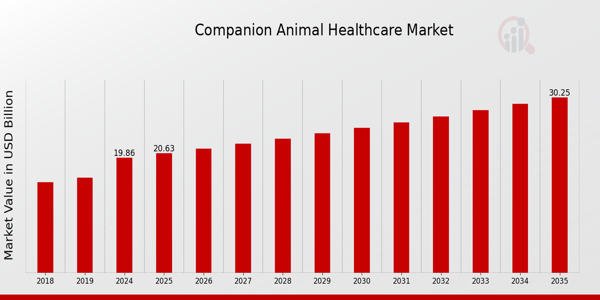Genres:Artbook
🇬🇧English
< 30 votes
0 votes
5
00.0%4
00.0%3
00.0%2
00.0%1
00.0%The global Companion Animal Healthcare Market is undergoing a significant transformation, driven by rising pet ownership, growing emotional connection between pets and their owners, and increased awareness around preventive veterinary care. From diagnostic testing to advanced therapies, the market reflects a wider cultural shift where pets are increasingly considered family members, not just animals. This evolving perspective is shaping how healthcare providers, pharmaceutical companies, and pet owners approach animal health.
Rising Pet Ownership and Human-Animal Bond
One of the key drivers behind the growth of the companion animal healthcare market is the surge in pet ownership worldwide. Whether it’s a dog, cat, or exotic animal, more households are welcoming pets into their lives, especially post-pandemic. These furry companions are not only valued for companionship but also for the emotional support they offer. As a result, pet parents are more inclined to invest in wellness services, routine checkups, and high-quality medications.
Veterinary care is no longer just about treating illnesses—it’s about enhancing quality of life. This shift is evident in the rising demand for wellness programs, dental care, geriatric animal treatments, and even mental health services for pets. The emphasis is increasingly on prevention and early intervention, a trend that's driving innovation across the veterinary pharmaceutical and diagnostics landscape.
Advances in Veterinary Diagnostics and Pharmaceuticals
Technological advancements have made veterinary diagnostics more precise and accessible. Innovations such as point-of-care testing, telemedicine, and AI-assisted imaging are helping veterinarians detect diseases early and tailor treatment plans more effectively. This technological evolution is particularly important in managing chronic conditions like arthritis, diabetes, and heart disease in companion animals.
Pharmaceutical companies are also ramping up investments in animal-specific formulations. Unlike in the past where human drugs were often adapted for pets, we now see dedicated R&D efforts aimed at developing targeted treatments for animals. From flea and tick preventives to biologics and vaccines, the market is seeing a surge in pet-focused innovation.
Pet Insurance and Healthcare Spending
Another factor boosting the companion animal healthcare market is the growing popularity of pet insurance. As veterinary costs rise, more pet owners are turning to insurance to manage unexpected expenses. This trend is making advanced diagnostics and specialty care more accessible, further fueling market demand. According to recent market estimates, global spending on companion animal healthcare is projected to grow at a steady pace over the next few years.
Challenges and Future Outlook
Despite robust growth, the industry faces a few challenges. A shortage of trained veterinary professionals, especially in rural and underserved areas, limits access to quality care. Additionally, regulatory hurdles around drug approvals and concerns over antibiotic resistance continue to pose concerns. However, ongoing collaboration between regulators, industry players, and veterinary schools offers hope for systemic improvements.
Looking ahead, the companion animal healthcare market is poised for sustained growth, supported by digital transformation, expanding pet services infrastructure, and a deepening societal commitment to animal welfare. As the human-animal bond strengthens, so too does our responsibility to ensure pets receive the same level of care and attention as any other family member.
Views
Total: 0/360 days: 0/180 days: 0/90 days: 0/30 days: 0/7 days: 0/24 hours: 0/12 hours: 0/6 hours: 0/60 minutes: 0
MPark Page Creation
U.1283332 at GMT
Chapters
Reviews(0)
Comments(0/0)
MPLists(0)
